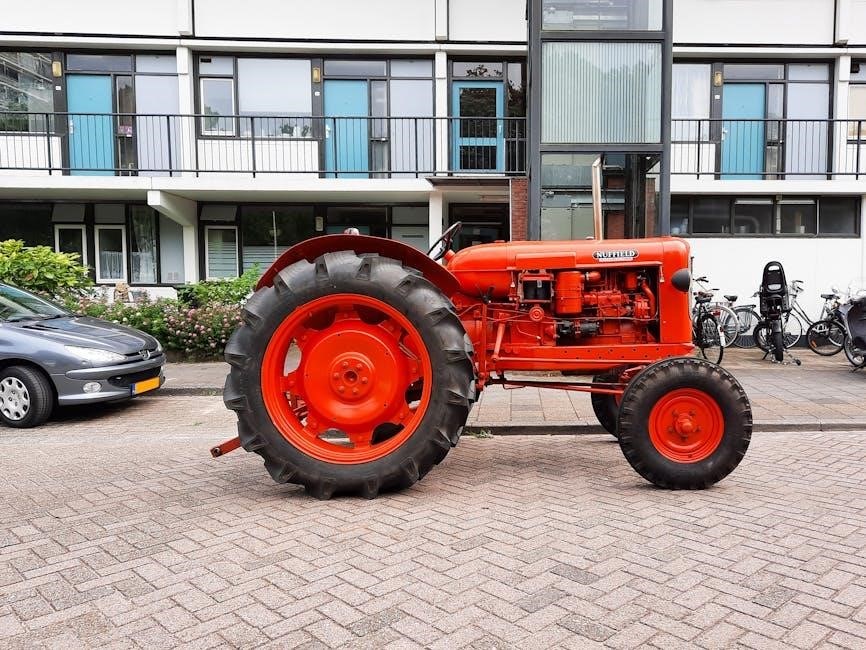Mechanical Aptitude Questions and Answers PDF: A Comprehensive Guide
Mechanical aptitude tests are crucial for assessing a candidate’s understanding of mechanical principles. These tests evaluate abilities in areas like force, motion, energy, and tool usage. A comprehensive guide focusing on mechanical aptitude questions and answers in PDF format serves as a valuable resource. It’s essential for individuals preparing for technical or engineering positions.
Understanding Mechanical Aptitude Tests
Mechanical aptitude tests are designed to evaluate an individual’s ability to understand and apply fundamental mechanical and physical principles. These assessments gauge comprehension of how mechanical systems operate, encompassing key concepts such as force, motion, energy, and the utilization of tools. The tests are frequently employed in the hiring process for roles that demand a practical understanding of mechanical concepts, machinery, and tools.
The purpose is not to measure pre-existing knowledge but rather to assess the capacity to learn and apply mechanical reasoning. Common question types explore areas like simple machines (levers, pulleys, gears), spatial relations, and the behavior of objects under different conditions. Candidates are evaluated on their ability to interpret diagrams, solve problems logically, and predict outcomes based on mechanical principles.
Understanding the format and content of these tests is crucial for effective preparation. Familiarizing oneself with the types of questions asked and the underlying mechanical concepts can significantly improve performance. This involves reviewing basic physics principles and practicing with sample questions to develop problem-solving skills and build confidence.
Common Concepts Tested
Mechanical aptitude tests commonly assess a range of fundamental mechanical and physical concepts crucial for understanding how machines and systems operate. Key areas include the principles of simple machines such as levers, pulleys, gears, and inclined planes. Questions often involve calculating mechanical advantage, determining force requirements, and analyzing the relationships between components in a system.
Another frequent topic is the understanding of forces, including gravity, friction, and tension. Test-takers may be asked to analyze how forces interact to affect motion or equilibrium. Concepts related to energy, such as potential and kinetic energy, and their conversion, are also frequently examined. Furthermore, the tests often explore spatial reasoning, requiring individuals to visualize and manipulate objects in three dimensions.
Questions related to fluid mechanics, basic electricity (circuits), and the properties of materials may also appear. Familiarity with these concepts is essential for success. Understanding how these principles apply in real-world scenarios is key to tackling the problems presented in mechanical aptitude tests. Practicing with diverse questions covering these topics will enhance preparedness.
Sample Questions and Solutions
To illustrate the nature of mechanical aptitude tests, consider this sample question: If a lever has a fulcrum positioned closer to one end, how does this affect the force required to lift a load on the shorter end? The correct answer involves understanding that the shorter the distance from the fulcrum to the load, the less force is needed to lift it, due to increased mechanical advantage.

Another example: Two gears are meshed together. If the larger gear rotates at 60 RPM and has 120 teeth, and the smaller gear has 40 teeth, what is the RPM of the smaller gear? The solution requires recognizing the inverse relationship between teeth and RPM, leading to the calculation that the smaller gear rotates at 180 RPM.
These sample questions highlight the need to apply fundamental principles. Solutions involve understanding the underlying mechanical concepts, setting up the problem correctly, and performing accurate calculations. Practice with a variety of sample questions is essential. Reviewing detailed solutions helps identify areas of weakness. Focus on both the conceptual understanding and the problem-solving techniques.
Free Online Practice Tests

Numerous platforms offer free online mechanical aptitude practice tests, providing a valuable resource for test preparation. Websites like JobTestPrep, Practice Aptitude Tests, and AssessmentDay frequently feature sample questions and practice tests designed to simulate the actual test environment. These resources allow candidates to familiarize themselves with the question formats, time constraints, and content areas covered in mechanical aptitude assessments.
These free tests typically include a range of questions related to basic physical forces, spatial reasoning, and mechanical principles. Candidates can assess their understanding of levers, pulleys, gears, and other fundamental mechanical components. Some platforms also provide immediate feedback and explanations for correct answers, enabling users to identify areas for improvement and refine their knowledge.
While free practice tests offer a helpful starting point, it’s essential to supplement them with other study materials. Consider utilizing comprehensive study guides, reviewing mechanical concepts, and seeking additional practice questions to ensure thorough preparation for the mechanical aptitude test. Remember that consistent practice and targeted study are key to achieving a successful outcome.
Where to Find Free PDF Resources
Locating free PDF resources for mechanical aptitude test preparation can significantly aid in your study efforts. Several online platforms and educational websites offer downloadable PDFs containing sample questions, practice tests, and comprehensive guides. These resources provide a convenient way to access and review essential material offline.
Begin your search by exploring educational forums and websites dedicated to aptitude testing. These platforms often host user-generated content, including shared PDFs and study materials. Additionally, check the websites of testing preparation companies; they sometimes offer free sample PDFs as a promotional tool.
Consider exploring university websites and online libraries, as they may contain relevant resources in their collections. Remember to verify the credibility and accuracy of any PDF resources you find, ensuring that the content aligns with the format and content of the specific mechanical aptitude test you are preparing for. By utilizing these free PDF resources effectively, you can enhance your understanding of mechanical concepts and improve your test-taking skills.
Preparing for Specific Tests (Bennett, Wiesen, Ramsay)

When preparing for mechanical aptitude tests, tailoring your study approach to the specific test format and content is crucial for success. The Bennett Mechanical Comprehension Test (BMCT), the Wiesen Test of Mechanical Aptitude (WTMA), and the Ramsay Mechanical Aptitude Test each have unique characteristics that demand focused preparation.
For the BMCT, focus on understanding fundamental mechanical principles, including simple machines, gears, and tool usage. Practice with sample questions that mirror the test’s emphasis on practical, real-world scenarios. When preparing for the Wiesen test, concentrate on everyday objects and situations, as the test assesses your understanding of mechanics in a familiar context. The Ramsay test, on the other hand, often includes questions related to physics and mechanical principles, requiring a more technical understanding.
Utilize practice tests and study guides specific to each test to familiarize yourself with the question types and difficulty levels. This targeted approach will enable you to identify your strengths and weaknesses, allowing you to concentrate your efforts on areas that require improvement, ultimately enhancing your performance on the chosen mechanical aptitude test.
Key Areas Evaluated
Mechanical aptitude tests assess a range of skills and knowledge to determine an individual’s ability to understand and apply mechanical principles. Several key areas are consistently evaluated across different mechanical aptitude tests, and mastering these areas is vital for achieving a high score.
One of the primary areas assessed is the understanding of basic physical forces, including gravity, friction, and tension. Test-takers are expected to demonstrate their knowledge of how these forces affect mechanical systems. Another crucial area is the comprehension of simple machines, such as levers, pulleys, gears, and inclined planes. These tests evaluate your ability to analyze how these machines work and how they can be used to solve mechanical problems.
Furthermore, the ability to interpret spatial relationships and visualize how mechanical components interact is frequently tested. Questions in this area may involve understanding diagrams, identifying the direction of movement, or determining how different parts fit together. Additionally, the tests often assess your knowledge of basic electrical circuits, fluid mechanics, and the properties of materials. A strong foundation in these key areas will significantly improve your performance on mechanical aptitude tests.
Tips and Strategies for Success
Excelling on mechanical aptitude tests requires more than just innate ability; strategic preparation is key. One of the most effective strategies is to thoroughly review fundamental mechanical principles, including forces, motion, energy, and simple machines. Understanding concepts like levers, pulleys, gears, and basic electrical circuits will provide a solid foundation for tackling test questions.
Practice is also crucial. Utilize free online practice tests and PDF resources to familiarize yourself with the test format and types of questions asked. Analyze your mistakes to identify areas where you need to improve. Pay close attention to the wording of questions, as they can often be tricky. Visualize the scenarios presented in the questions and try to break down complex problems into simpler steps.
Time management is another essential skill. Practice answering questions under timed conditions to improve your speed and accuracy. If you encounter a difficult question, don’t spend too much time on it; move on and come back to it later if time permits; By combining a strong understanding of mechanical principles with effective practice and time management, you can significantly increase your chances of success on mechanical aptitude tests.

Mechanical Reasoning Practice Questions
Engaging with mechanical reasoning practice questions is a pivotal step in preparing for aptitude tests. These questions often present scenarios involving everyday objects and mechanical systems, requiring you to apply basic physics principles to determine the outcome. For example, questions might involve levers, pulleys, gears, or springs.
A typical question might ask about the direction of rotation of gears in a system or the amount of force required to lift a weight using a pulley. Other questions could explore concepts like momentum, equilibrium, or the behavior of fluids. When tackling these questions, it’s helpful to visualize the scenario and break it down into simpler components.
Consider the forces acting on the system and how they interact. Remember fundamental principles like the conservation of energy and Newton’s laws of motion. Practicing a variety of questions will expose you to different types of problems and help you develop your problem-solving skills. Pay attention to the details in each question, as subtle changes can significantly alter the answer. By consistently practicing, you can sharpen your mechanical reasoning abilities and improve your test performance.
Utilizing Practice Tests and Guides
To effectively prepare for a mechanical aptitude test, strategically utilizing practice tests and comprehensive guides is essential. Practice tests simulate the actual exam environment, allowing you to become familiar with the question types, time constraints, and overall format. This familiarity reduces anxiety and improves your ability to perform under pressure.
Guides provide structured learning, covering key mechanical concepts and principles in a clear and concise manner. They often include detailed explanations of solutions, helping you understand the underlying logic and reasoning behind each answer. When selecting practice tests and guides, prioritize resources that offer realistic questions and comprehensive explanations.
It’s beneficial to take multiple practice tests to track your progress and identify areas where you need further improvement. After each test, carefully review your answers, paying close attention to the explanations for both correct and incorrect responses. Use guides to reinforce your understanding of the concepts tested in the questions you struggled with. By combining the benefits of practice tests and guides, you can build a solid foundation of knowledge and develop the skills necessary to succeed on the mechanical aptitude test.